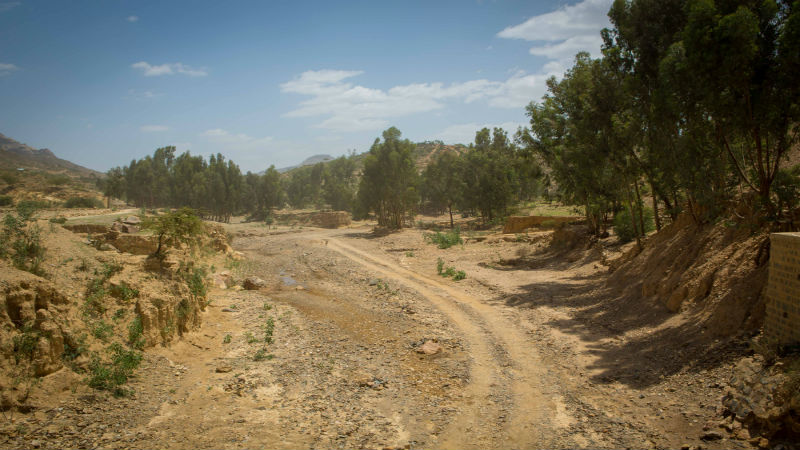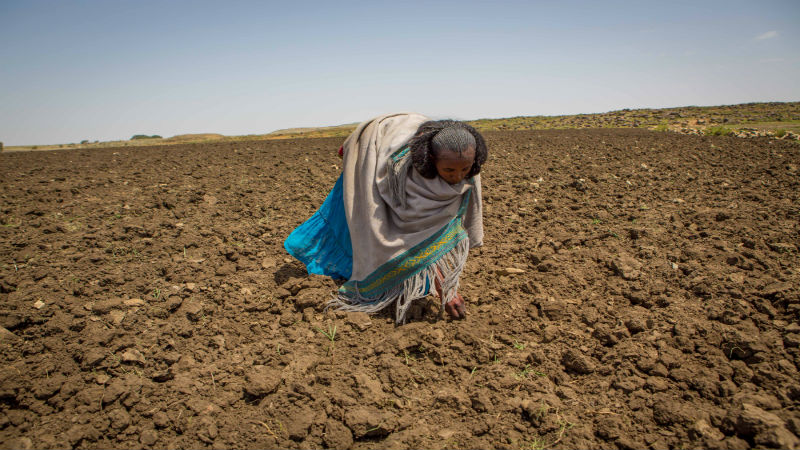Ethiopia Food Crisis Appeal – Ten million people at risk of hunger

CAFOD’s World News Manager, Nana Anto-Awuakye has returned from Ethiopia where ten million people currently face extreme hunger. She visited CAFOD’s partners in the northeast of the country to see how they are trying to tackle the devastating effects of the worst drought the country has seen in 30 years.
It is truly shocking to hear a mother talk about her children going hungry, to say that she can’t remember the last time she was able to feed her children three meals a day.
Donate to the CAFOD Ethiopia Food Crisis Appeal now
Last month, I was in Ethiopia’s north eastern region, where I met mothers who told me that they, along with millions of others, are facing severe hunger because of food shortages brought on by drought.
One such mother is Herit who lives in a village called Arato in the country’s northern Tigray region. There are around 1,200 families here, and nearly a third of these families are run solely by mothers like Herit.
Severe drought destroys crops
All Herit’s crops were destroyed by what is being described as the worst drought in 30 years – made even worse by one of the strongest El Niño weather patterns on record. She told me: “During a good season, we would have cultivated barley, wheat, and pulses. My harvest would be more than 200kg.
“But this year has been a very tough year; there has been little rain and nothing has grown, so we have nothing.”
Our partners are reaching vulnerable families
CAFOD’s local Church partner, ADCS Mekelle has been helping Herit and her neighbours with transfers of cash. This money – 477 Birr (around £16) – is a lifeline for her. It allows her to buy food locally to keep her family alive.
“Before the help we received, we ate what we could when we could,” says Herit.
Herit shows me her bag of wheat flour, and makes it quite clear that if she didn’t receive this food aid, her options would be desperately bleak.
“If I did not get this assistance, my children and I would be dead. Because I have been able to buy this food, my children are living and we are surviving.”
Watch my updates from Ethiopia
[youtube https://www.youtube.com/watch?v=videoseries?list=PLCqV6mKXfbD8s0JK2tSWEFBzrNQfmESud&w=560&h=315]
Food with dignity

Allowing vulnerable families to buy the food they need is a more dignified approach to food distribution, explains, Manderfro Aynalem, CAFOD’s Humanitarian Officer: “This approach gives dignity to the families affected, and allows markets to keep working where food is available, but previously unaffordable.”
Find out more about our emergency response in Ethiopia
Like Herit, more than 85 per cent of the population in Ethiopia live in rural areas as subsistence farmers, cultivating rain-fed agricultural crops such as barley and wheat. During a good season, farmers are able to grow enough to take them into the next planting season.
In the past Herit has managed to feed her family of five from the hectare of land that she farms herself, so this crisis has also been a challenge to her dignity.
She proudly explains that she is a strong leader for her family, teaching her children to live with nature and to never be wasteful. She is proud that she has been to stand on her own and does not want to be dependent on aid.
“I have worked hard for a better life; to go back to dependency is very difficult for me. I feel sad, it hurts me inside.”
Whatever you are able to donate, you are helping our local partners reach more vulnerable families.
Hope for rain
Out on her land, Herit busily clears stones, and plucks weeds. She doesn’t have her own animals but is able to share with neighbours the use of an ox to plough her plot.
Last month, there were some erratic rain falls, but not enough to hold back the drought. Herit and other farmers in the village have diligently prepared their land. They will also receive seeds supported by CAFOD through local partner the Relief Society of Tigray (REST). Herit hopes that the ‘big rains’ – longer rains – will arrive in July, and that she will be able to grow barley.
“Some farmers have sown their seeds. We are hoping, we are praying, that the rains will come.”
The drought is predicted to continue into November 2016 and possibly beyond. Even if the rains do come, there will be a hunger gap for families like Herit while they wait to see if there will be anything to harvest in the next three to five months.
“We are in the hands of the government and the NGOs to help us with food during these harsh times, and we are in the hands of God for the rain.”
Donate to CAFOD’s Ethiopia Crisis Appeal ordonate by telephone by calling 0500 85 88 85
Reblogged this on CAFOD Leeds Blog.
Reblogged this on CAFOD Leeds Blog.